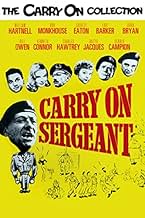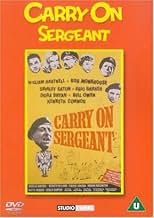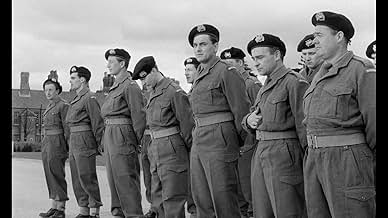Agrega una trama en tu idiomaSergeant Grimshawe wants to retire in the flush of success by winning the Star Squad prize with his very last platoon of newly called-up National Servicemen. But what a motley bunch they tur... Leer todoSergeant Grimshawe wants to retire in the flush of success by winning the Star Squad prize with his very last platoon of newly called-up National Servicemen. But what a motley bunch they turn out to be.Sergeant Grimshawe wants to retire in the flush of success by winning the Star Squad prize with his very last platoon of newly called-up National Servicemen. But what a motley bunch they turn out to be.
- Dirección
- Guionistas
- Elenco
- Dirección
- Guionistas
- Todo el elenco y el equipo
- Producción, taquilla y más en IMDbPro
Opiniones destacadas
This film is the obvious inspiration for Bill Murray's 'Stripes', which, while funny, doesn't have anywhere *near* the charm of 'Carry On, Sergeant'. It holds up very well, indeed.
As the first of the original five films these form, along with Cabby, (not counting the intentional noir of Spying), the only examples of the series in black and white. Far away from the whistles and bells, boobs and bums of the accepted format, the largely all-male cast plays out a light character comedy. The few female roles are better developed than in the 70s; something you might suspect would be the other way around.
There's the odd sight of players who never made a repeat appearance, such as stars William Hartnell and smug Bob Monkhouse, here quite good in his dashing leading man role. Of what were to become the regulars, Charles Hawtrey is his usual self in one of his funniest performances, though it's weird to see Kenneth Williams actually acting. Here he plays it straight as Jim, the spoilt rich kid with a degree. His bolshie character "don't you think this is a trifle out of date in a world bristling with H-bombs, Sergeant?" is quite refreshing, and Williams plays him with admirable conviction. Later he would opt for camping up his roles in more and more over the top performances, which were nevertheless much funnier. This is what marks the fundamental difference between Sergeant and the majority of the franchise; it has a greater mark of quality, but it isn't that amusing.
Occasional lines show what was to come ("Your rank?" "Well that's a matter of opinion") and there's also the "raise your back sight" line and the scene with the fire extinguishers. Some of the jokes are a little obvious, such as Kenneth Connor's vaguely irritating hypochondriac being called Strong. Though the relative cleanness of his ultimate medical check up shows how much broader and coarser the series was to become. This is more in the traditional mould, where the comedy arises out of the situation, rather than the situation being contrived around non-stop jokes and innuendo. While the next year's follow-up, Nurse would see quite racy shaving and daffodil scenes, it was still tied in to the same sort of (relative) naturalistic performances. It wasn't until around 1962's Cruising that the Carry Ons as they're most remembered started to emerge. This is strange, because while the first seven films with their sub-Ealing sensibilities now seem out of place in the franchise, they ARE the Carry On franchise. The Talbot Rothwell scripts which are so well remembered are actually subversions of the series into broader comedy. Certainly dated, Sergeant's humour is unusually underdefined, particularly in a modern context. This is the film all over, then: commendable, if not actually all that funny.
Shirley Eaton provides the eye-candy as Monkhouse's fresh bride, who contrives to get a job in the barracks' kitchen in order to be near him; her companion, ugly-duckling Dora Bryan, has set her eyes on hypochondriac Connor (who is forever appearing before medical officer Hattie Jacques with some mysterious ailment or other, until she decides to have him undertake a thorough test by several specialists so as to declare him physically fit once and for all!). Hawtrey is typically bumbling; Williams scores best as a smug, know-it-all recruit (he plays it quite straight and, again, variations of this were seen in CARRY ON NURSE [1959] and CARRY ON, CONSTABLE). Needless to say, once the boys realize what the outcome of their training would mean for the long-suffering Hartnell, they put their best foot forward to send him home with his well-deserved prize in tow.
¿Sabías que…?
- TriviaWilliam Hartnell was rather like his character off screen, and could regularly be heard barking at actors who fluffed their lines. Indeed, a visiting brigadier was highly complementary to Hartnell's drilling technique.
- ErroresWhen Captain Potts pins the chart to the training progress board, the board has the intake as No.29 but when the prize giving is announced near the end of the film it is announced as the prize giving for the 60th intake
- Citas
Captain Potts: Who are you?
Miles Heywood: 4277298 Private Heywood, M, sir.
Captain Potts: Heywood? Ever heard of General Heywood?
Miles Heywood: My father, sir.
Captain Potts: Really? Read Admiral Heywood?
Miles Heywood: My grandfather, sir.
Captain Potts: Air Commodore Heywood?
Miles Heywood: My uncle, sir.
Captain Potts: Ah! Quick test. What's the first thing that comes into your head?
Miles Heywood: Women, sir.
Captain Potts: You're a soldier by tradition and instinct.
- ConexionesFeatured in Film Night: Carry on Forever (1970)
Selecciones populares
- How long is Carry on Sergeant?Con tecnología de Alexa
Detalles
- Fecha de lanzamiento
- País de origen
- Idioma
- También se conoce como
- Kopf hoch - Brust raus
- Locaciones de filmación
- Productora
- Ver más créditos de la compañía en IMDbPro
Taquilla
- Presupuesto
- GBP 73,000 (estimado)
- Tiempo de ejecución1 hora 24 minutos
- Color
- Relación de aspecto
- 1.66 : 1
Contribuir a esta página




































